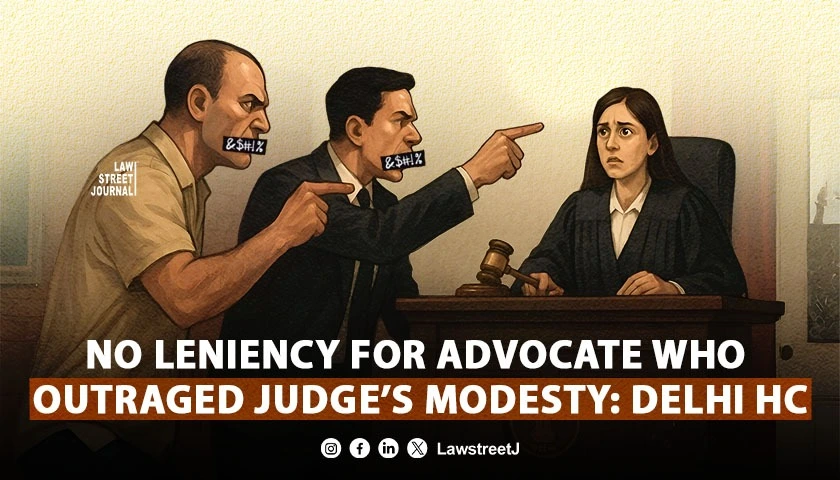New Delhi: The Delhi High Court has delivered a landmark judgment emphasizing that threats and gender-specific abuse against judicial officers constitute an assault on justice itself, while upholding the conviction and sentence of an advocate who outraged the modesty of a female Metropolitan Magistrate.
Justice Dr. Swarana Kanta Sharma made crucial observations on the protection of women judicial officers and the sanctity of courtroom conduct in the case involving an advocate.
The court addressed a criminal revision petition filed by an advocate, challenging his sentence for outraging the modesty of a female Metropolitan Magistrate. The court noted, "This case narrates a deeply disturbing incident. It presents shocking conduct of an Advocate – conduct which is completely unacceptable."
Describing the incident that occurred on October 30, 2015, at Karkardooma Courts Complex, the court observed, "The petitioner suddenly began shouting in open court. He allegedly used abusive and disrespectful language towards the presiding judge Ms. 'X', and said 'aise kar dia adjourn matter, aise kesedate de di, main keh rha hun, abhi lo matter, order karo abhi.”
The court highlighted the severity of the advocate's conduct, stating, "He then allegedly uttered an extremely offensive and vulgar remark towards Ms. 'X', stating: 'chadhi far kar rakhdunga.' She sought the accused's identification and directed court staff to retain him for a breath analysis. However, before the test could be conducted, the petitioner fled the courtroom while continuing to hurl filthy abuse at her."
The court emphasized the gendered nature of the abuse, observing, "When a female judge becomes the target of personal indignity and humiliation by an officer of the court – an advocate: as in the present case – it reflects not only a personal wrong but also the systemic vulnerability women continue to face, even at the highest echelons of legal authority."
In a significant directive addressing institutional protection, the court instructed, "No judicial officer, particularly those at the district level who form the backbone of our justice delivery system, should ever be made to feel exposed or unsupported. The female force within the judiciary must never be left feeling helpless or as though they are to be treated at someone else's pleasure."
The court rejected the plea for leniency, stating, "To take a lenient view in a case like the present, where shameful language was used against a judicial officer, would amount to doing injustice to justice. The seat of a judicial officer has its own dignity and is sacrosanct for members of the community who appear before her."
The court emphasized that advocates have heightened responsibilities, noting, "The robe of an advocate is not just a symbol of learning, but of character. Therefore, every word uttered, every act performed in a courtroom, must reflect the solemnity of the profession."
The court upheld the conviction under Sections 186, 189, 228, 353, and 509 of the Indian Penal Code, but modified the sentence to run concurrently rather than consecutively, reducing the total sentence from 24 months to 18 months. The advocate was also directed to pay Rs. 50,000 as compensation to the victim.
The court concluded "Though justice is traditionally considered blind, however, it refers to the blindfold which does not let it differentiate or recognize inequality on the basis of gender, religion, caste, class, social standing, or power – but weighs both sides before it without being affected by whosoever the parties are. In the above background, it can be thus safely said that – justice may be blind in the above sense, but is not silent."
Mr. Sanju Gupta, Ms. Varsha Ahluwalia, Mr. Lalit Kumar Sharma, Mr. Deepanshu Lakra, Mr. Lakshay Tyagi and Mr. Akshay Tyagi, Advocates appeared for the Petitioner, and Mr. Rajkumar, APP appeared for the State.
Case Title: Sanjay Rathore vs. State (Govt of NCT, Delhi) & Anr.



![Delhi High Court Sets Aside Arbitral Tribunal's Award Against NHAI in Highway Project Delay Case [Read Judgment]](/secure/uploads/2023/07/lj_9605_23374c2e-392c-4491-a2fe-f2f12fc5272f.jpg)
![Delhi Court Rejects Stay Request in Defamation Case Against Rajasthan CM Ashok Gehlot [Read Order]](/secure/uploads/2023/08/lj_5208_80de1ddc-d76a-4f7f-b180-408e3ae14fb4.jpg)







